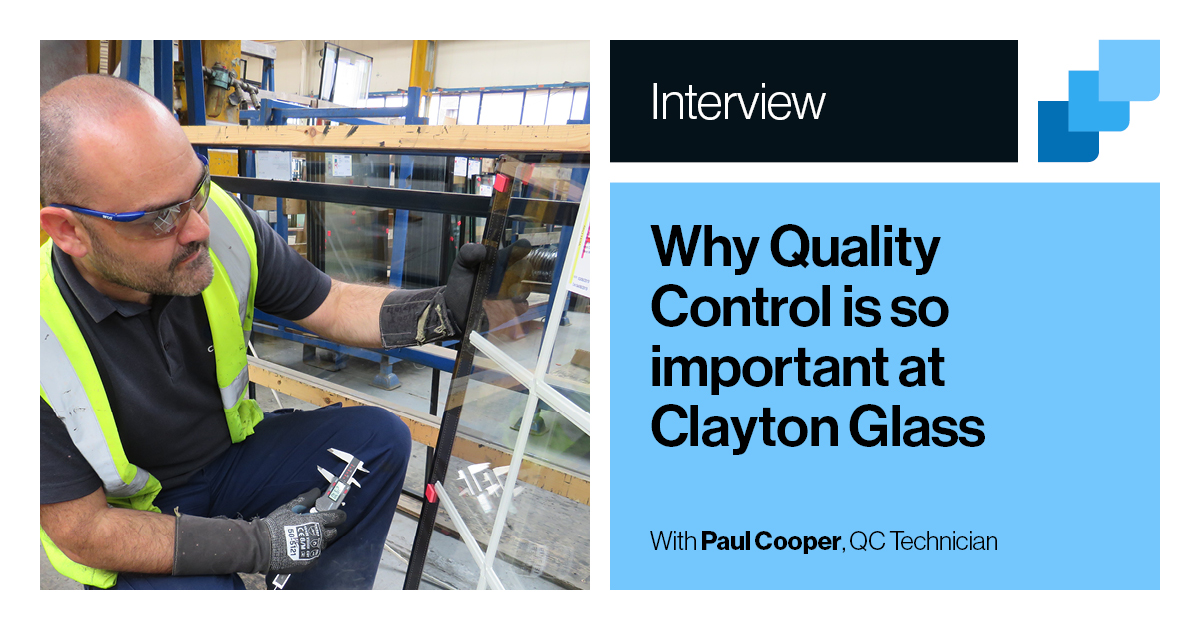Quality control. Two words very familiar to anyone working in the manufacturing sector. We sat down with Clayton Glass’ highly-attentive Quality Control Technician, Paul Cooper, to discuss quality control and how it contributes to a successful business.
In a manufacturing business, especially in the glass industry, quality control is a highly important aspect of the production process. When you think of a quality control employee, you think of someone who is driven. Someone skilled, with a high attention to detail. Paul Cooper, Clayton Glass’ Quality Control Technician embodies this description perfectly.
WHAT IT TAKES
The first thing we discuss, is the qualities necessary to the skillset of a quality control worker. “There are a number of qualities that could be considered important in my line of work. But, by far the most vital, is a keen eye for detail.” Says Paul. According to Paul, this ‘keen eye’ needs to be trained to see imperfections. To be able to spot defects before the product reaches the customer. “That is the single most important thing” says Paul, sternly.
Paul goes on to tell me about the other skills he feels are useful in quality control. “Communication is key” he says, “to be able to communicate at all levels, that’s customers, clients and colleagues. This is very important. Beyond that, focus and reliability would be two other important qualities.”
WHY QUALITY CONTROL?
Paul breaks into a smile, when I ask him why he chose to lead a career in quality control. “I never actually chose to work in quality control.” Paul begins, “I had only been here for a few months when our old QC (Quality Control Technician) announced he was leaving. Before he did, he approached me about becoming the new QC. He said he thought I had the required attitude and qualities to succeed in the role.”
There are a number of qualities that could be considered important in my line of work. But by far the most vital, is a keen eye for detail.
Paul Cooper, Quality Control Technician
Paul goes on to tell me that, at the time, he never would have applied for the role off his own back. But, with the faith of the previous Quality Control Technician he decided to go for it. “16 years on I’m very pleased I decided to apply for the role! To be fair I have always been a natural perfectionist, just ask my wife!” Paul is still smiling as he tells me about the tenacity that has always made up a part of his character. “I will do things over and over and over again until they are perfect.”
QUALITY CONTROL: THE ENJOYABLE AND THE CHALLENGING
“I enjoy the testing and technical side of things” Paul begins, “using our great equipment to test for imperfections is enjoyable.” Paul tells me that he enjoys the days when he is out mixing with customers and clients as much as he enjoys a day of testing in the factory. “That’s one thing that surprised me about this job role”, Paul says, “the amount of variation in it, no two days are the same, which is always a bonus when you’re working in a factory.”

I then ask Paul to tell me about the most challenging aspects of his line of work, something he thinks long and hard about before answering. “I think working to strict deadlines is the most challenging aspect of my work, because you have to work quickly, but the quality cannot falter” says Paul. Paul tells me that this is a tricky situation for a quality control worker as the quality of the quickly-made product needs to be up to standard.
CLAYTON GLASS QUALITY
The conversation turns to the company where Paul carries out his quality control duties – Clayton Glass. “Are there factors or parameters that Clayton Glass have in place to ensure that the units are of required quality?” I ask. “Every single product is tested daily to standards set by the British Standards Institute (BSI) and the glass and glazing federation.” Says Paul.
If the quality is there, the customer comes back to you.
Paul Cooper, Quality Control Technician
Paul goes on to tell me that team leaders all carry out quality audits, and that he himself compiles a quality report at the end of every shift.
QUALITY CONTROL AND SUCCESSFUL BUSINESS
Many aspects contribute to a business’ success. However, it is not an exaggeration to say that the success of a business hinges on the quality of the products they sell, regardless of what those products are. It is in this way that quality control can affect successful business. If one faulty product slips through the cracks and ends up on a delivery truck, this can lead to an unsatisfied customer, and if you have too many of these, it can be at the detriment of your business.
Paul believes that if the quality is right, the customers are happy and subsequently the business has a platform to be successful. “If the quality is there, then the customer comes back to you, you’ve then become tried and trusted” says Paul, “from there the customer may recommend you to others, and subsequently the business grows.”
CONCLUSION
Quality Control. Two words far more important to successful business than this writer could have ever imagined. Not only this, there is something humbling about the way Paul speaks about his quality control journey. How he did not choose this career, instead how he was selected for it based on the qualities he expressed in different job roles, then went on to fall in love with it. To conclude, Paul found his home in quality control, the essential art-form practised by successful businesses. Thank you for reading.





